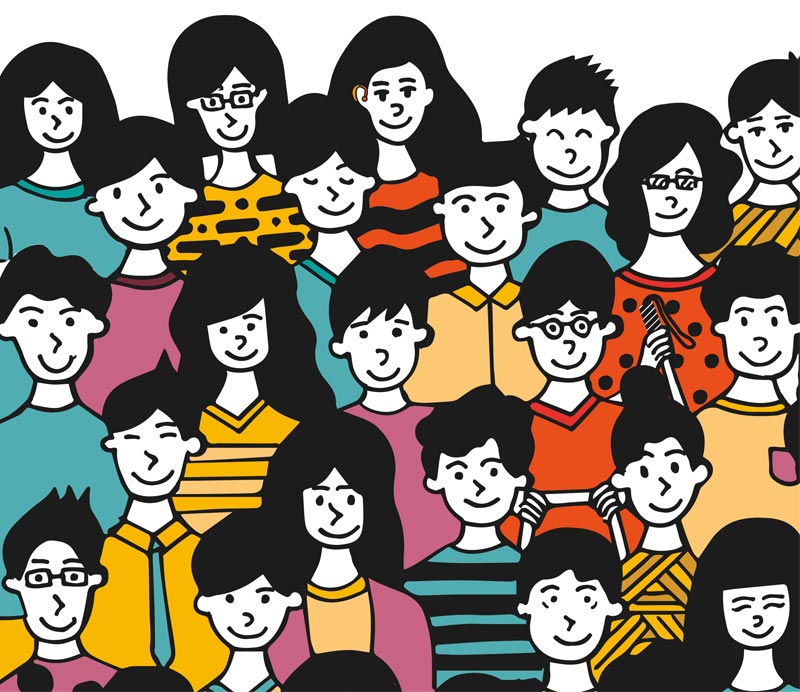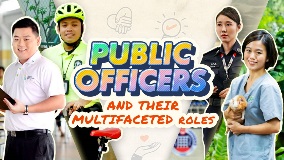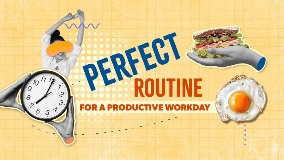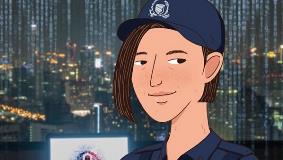Just Like Anyone Else: Persons With Disabilities In The Public Service

From a distance, Mr Fam Guo Liang looks like any other inspector at Tuas South Incineration Plant. The senior technical officer can be found carrying out tests on water, ash, scrap metal, refuse and other samples at the plant’s laboratory.
Move closer to him, and you would notice that Mr Fam wears hearing aids. Diagnosed with congenital sensory deafness in both ears at birth, he can only hear slight noises without the assistive devices.
But he has thrived at the National Environment Agency (NEA) since joining in 2011, and requires little supervision.
As of December 31, 2014, there are about 150 persons with disabilities (PwDs) working in the Public Service.
While Mr Fam applied for his job on his own initiative, others like Mr Ong Peng Kai had help from SG Enable, an organisation under the Ministry of Social and Family Development that provides assistance to PwDs (see sidebox).
Mr Ong is an assistant manager at the National Council of Social Service (NCSS). The 23-year-old has cerebral palsy and gets around with a rollator, or a rolling walker. The condition affects his brain nerves and leg muscles.
He started his job search in May 2015 after graduating from university, looking for job opportunities on his own even after he had got in touch with SG Enable.
In the beginning, the companies that responded to his application offered roles that he could not take on because of his condition. “They were jobs like sales or marketing that required me to move about quite a bit,” said Mr Ong.
After the first month, he decided to highlight his condition on his résumé. “Since then, no one got back to me,” he recalled. He eventually received an offer from the NCSS and started work in August 2015, monitoring services provided by voluntary welfare organisations in the disability sector. SG Enable also facilitated a disability awareness session for NCSS staff who would be working with him.
About SG Enable
Set up in July 2013, SG Enable supports the needs of PwDs through improving their employability and employment options, and working with employers and other stakeholders to better support PwDs. At SG Enable’s Enabling Village, for example, the National Library Board has offered digitisation jobs for six persons with autism, in a partnership with the Autism Resource Centre, a voluntary welfare organisation.
That was the second time Mr Ong had sought help from SG Enable. Back in 2014, he obtained an internship at Standard Chartered Bank through the organisation, during which he worked on improving the bank’s call centre efficiency.
Now at the NCSS, it is the “simple things” his colleagues do that help to make the workplace a more inclusive one for Mr Ong: they walk at a slower pace whenever they head out for lunch together, accompany him up the stairs, and ensure that the work space is clutter-free for his ease of access. Mr Ong also has a workstation that is closer to the door.
Over at the NEA, Mr Fam faced his own set of challenges when he applied for his first full-time position after leaving school.
At the interview, facing a panel of four, he struggled to express himself eloquently. “Due to my hearing impairment, I have some difficulties in pronouncing words… Despite that, they chose to give me the opportunity over the rest of the candidates. This itself was a form of encouragement to me,” said Mr Fam.
Learning on the job also proved gruelling at first, as there were plenty of verbal instructions. To improve communication, he would use simple hand gestures and get “clues” from observing people’s eyes, facial expressions and actions.
The 25-year-old is grateful for the support shown at work: “My managers and colleagues will speak with me slowly, repeat their words or speak louder if necessary… For important work or instructions, they will write them out for me as well.”
Employers play a part
Raising awareness among employers is another way to support the hiring of PwDs, said Mr Norrizwan Rasip, a manager for Knowledge Management at the Ministry of National Development (MND).
Mr Norrizwan, who uses a wheelchair after sustaining a spinal cord injury 15 years ago, explained that despite some progress made, there are still many employers who may have reservations about having PwDs at their workplace.
Employers are generally inclusive in their hiring process, he said, but “they may not know how to go about doing it… how to interact with PwDs, things to look out for in terms of office renovation, assistive devices and so on.”
While Mr Norrizwan, 35, has never sought assistance from SG Enable (MND is his third place of employment), he believes more employers would benefit from tapping such organisations to clarify their doubts and concerns about hiring PwDs.
Indeed, Mr Norrizwan’s supervisor, Mr Simon Lam, a senior assistant director, said that before meeting Mr Norrizwan in 2014 for his interview, there was a slight apprehension among the selection panel. Aside from determining the job fit, the panel was concerned about the challenges Mr Norrizwan may face and whether the work environment could meet his needs.
“[But] after speaking to him, we were confident in his abilities and found him suitable for the job,” said Mr Lam.
Besides small adjustments to the office space, such as ensuring that the restrooms and corridors were wheelchair-friendly, little else had to be changed to accommodate Mr Norrizwan, who said he “doesn’t receive any special treatment”.
Describing him as an “independent and resourceful person”, Mr Lam said Mr Norrizwan has never been excluded from any duties because of his condition. For example, he was an ambassador at the MND’s roving exhibition for SG50 last year along with his colleagues, and was on-site to guide members of the public through the exhibition.
Working with Mr Norrizwan has also taught Mr Lam that “PwDs are no different from us. And I am hopeful that with more awareness and understanding, Singapore can be a more inclusive society forall”.
The NCSS has a booklet of tips on removing workplace barriers for PwDs.
For more on working with PwDs, read a Challenge (March/April 2014) article by Mr Alvan Yap, who is hearing impaired and has worked with other PwDs as a special education teacher and in advocacy work.
- POSTED ON
Mar 10, 2016
- TEXT BY
Matthias Tay
- ILLUSTRATION BY
Ng Shi Wei
-
Feature
“Odd” Jobs? Even Better!









